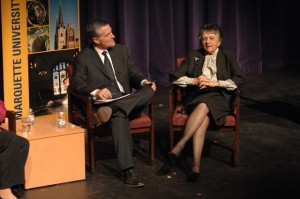 Jess Dickinson was on a roll, his Southern delivery infused with force and emotion. The Constitution is meaningless unless it is effective, said the presiding justice of the Mississippi Supreme Court. It is time, he said with rising voice, for judges to “stand up” and help insure that poor people have equal access to the courts.
Jess Dickinson was on a roll, his Southern delivery infused with force and emotion. The Constitution is meaningless unless it is effective, said the presiding justice of the Mississippi Supreme Court. It is time, he said with rising voice, for judges to “stand up” and help insure that poor people have equal access to the courts.
The audience noted its approval with a standing ovation, but that result was never in doubt. After all, the occasion was the Annual Meeting of State Access to Justice Chairs last Saturday in Jacksonville, a gathering of 168 lawyers, judges and state supreme court justices from over 40 states, Puerto Rico and the District of Columbia, all of whom have signed on to the cause of equal access. There was an understandable enthusiasm for the justice’s remarks.
And the audience included the Honorable Shirley Abrahamson, Chief Justice of the Wisconsin Supreme Court, making a rare but significant appearance at the meeting; significant because in Wisconsin, access to justice has not enjoyed the out-front leadership of the highest court as it has in many other states, including Justice Dickinson’s Mississippi.
The Wisconsin court, principally the Chief Justice, has been active in the cause of self-representation, striving to make the courts more user friendly to those who cannot afford a lawyer. The Court also approved changes to the rules of professional responsibility that paved the way for the expansion of brief advice clinics, and adopted a State Bar petition to create an Access to Justice Commission. The Chief Justice has led the way in promoting the study of limited representation, considered an essential step in addressing the problem of access to the courts.
Most significantly, the court approved the $50 annual assessment that goes to the Wisconsin Trust Account Foundation’s Public Interest Legal Services Fund, providing much needed funds as IOLTA income fell. (One of the more bizarre events I’ve ever witnessed is the State Bar Board of Governors actually debating a proposal to sue the Court because of the assessment.)
But it would be a stretch to say that our Court has been out in front, leading the way on access to justice issues in Wisconsin. Who better to advocate on the issue, to lobby lawyers to undertake pro bono, to talk to the legislature about the crisis, to be the public voice defining the problem and educating the public? The answer is obvious to the lawyers working on access issues, but while the Court is supportive of the effort, there is a seeming reticence to jump into the fight and mix it up.
In New York, the court facilitated a series of public hearings on the issue, but even better, convinced mortgage brokers, landlord associations and other key groups of the benefits of having represented parties on the other side. The result was a united effort that produced tens of millions of dollars in civil legal aid from the legislature.
In Wisconsin, there was little effort by the Court to convince the Joint Finance Committee to retain in the budget the $2.6 million in civil legal aid, and not a peep when it disappeared.
Almost all state Access to Justice Commissions have a supreme court justice on the commission. Our court declined the opportunity to be represented. Many state courts routinely make out-of-state lawyers pay fees, in the hundreds of dollars, to appear pro hac vice, with most, if not all of the money going to civil legal aid. In Wisconsin, a proposal specifically drafted for that purpose was reduced to $50, with the money going to the Office of Lawyer Regulation.
In many states the court leads the way; in Wisconsin, the lawyers are out in front.
This is not meant to single out the Chief Justice, who cares about access issues. The wish is that she, as the obvious court spokesperson, would be more publically vocal, more proactive. But she is only one of seven justices. Any of the others could choose to be a champion of the cause; none has.
Which is why the Chief Justice’s appearance in Jacksonville Saturday was significant, an offer of hope that the court will “stand up” and lead the fight.
